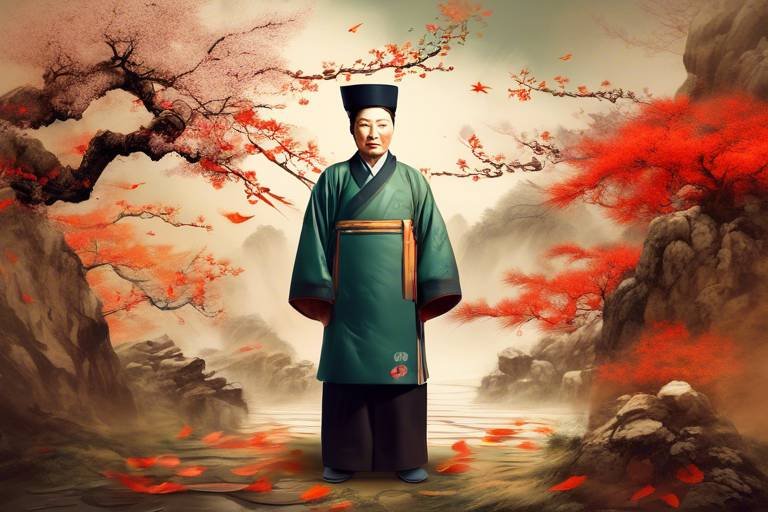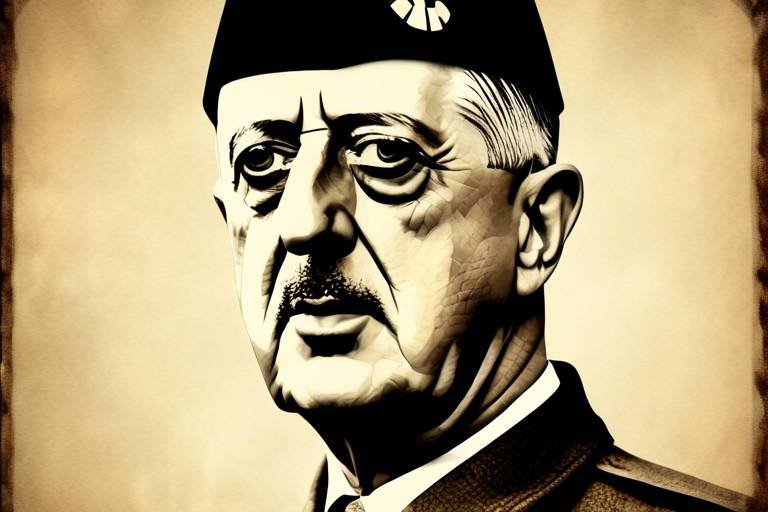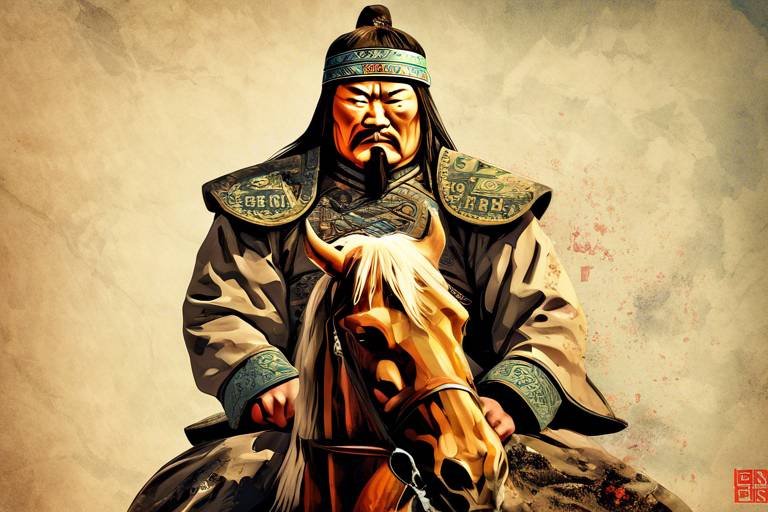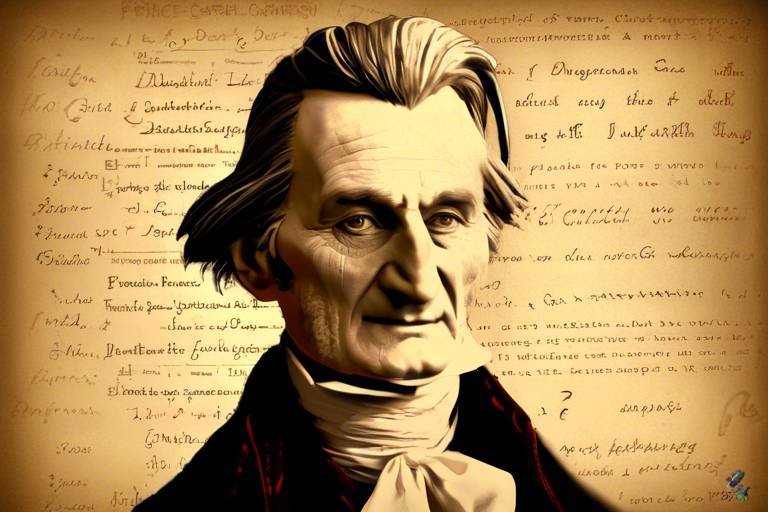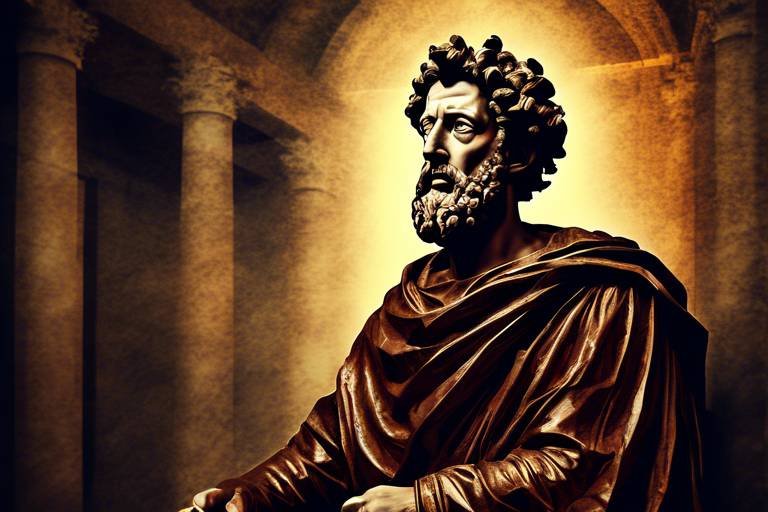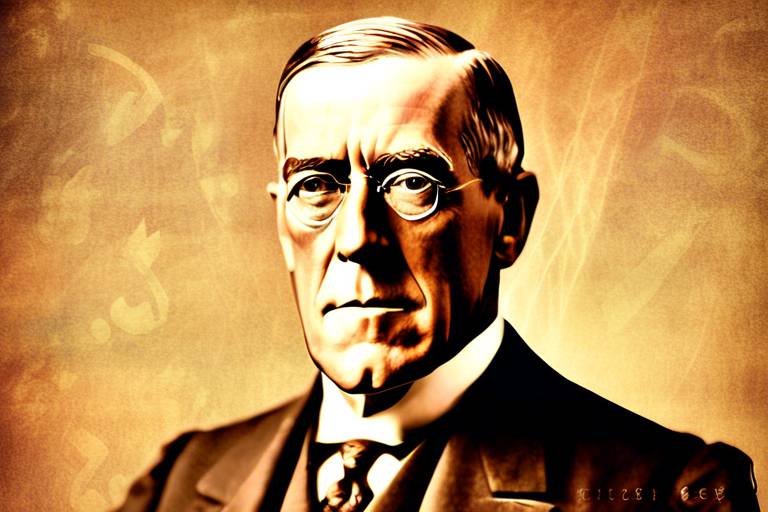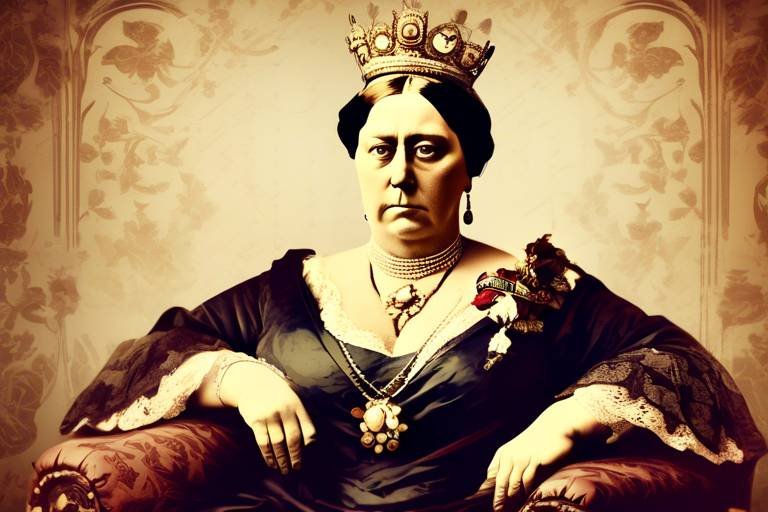Zuo Qiuming: The Historian of the Spring and Autumn Period
Zuo Qiuming, a renowned figure in Chinese history, stands out as a prominent historian who made significant contributions during the Spring and Autumn Period. His meticulous chronicles offer a window into the intricate political and social landscape of ancient China, providing invaluable insights that continue to shape our understanding of this pivotal era.

Life and Background of Zuo Qiuming
Zuo Qiuming, a significant figure in Chinese history, was born in the vibrant era of the Spring and Autumn Period. His early life was marked by a thirst for knowledge and a keen interest in understanding the complexities of the world around him. Growing up in a society undergoing profound political and social changes, Zuo Qiuming's upbringing was intertwined with the tumultuous events of the time, shaping his perspectives and influencing his future endeavors.
As he embarked on his educational journey, Zuo Qiuming delved into the rich tapestry of Chinese culture and history, immersing himself in the classical texts and philosophical traditions that defined his era. His intellectual pursuits led him to explore the intricacies of governance, ethics, and human nature, laying the foundation for his later work as a historian and chronicler of the Spring and Autumn Period.
Against the backdrop of a rapidly evolving society, Zuo Qiuming honed his skills as a meticulous observer and astute analyst of political developments. His keen insights into the power dynamics and conflicts of the time set him apart as a historian with a deep understanding of the complexities of ancient Chinese society.
Zuo Qiuming's background not only provided him with the necessary tools to navigate the intricate web of historical events but also instilled in him a sense of duty to preserve the rich tapestry of China's past for future generations. His commitment to documenting the nuances of the Spring and Autumn Period reflects his dedication to upholding the legacy of his ancestors and shedding light on the historical forces that shaped the world he inhabited.

Works and Contributions
Zuo Qiuming, the distinguished Chinese historian of the Spring and Autumn Period, left a lasting legacy through his remarkable works and contributions. His writings offer a window into the intricate political and social landscape of ancient China, enriching our understanding of this pivotal era.
One of Zuo Qiuming's most notable works is the Zuo Zhuan, a comprehensive historical text that chronicles the events of the Spring and Autumn Period with meticulous detail and insightful commentary. This masterpiece not only records the political developments of the time but also delves into the moral and ethical dimensions of governance, providing a holistic view of ancient Chinese society.
In addition to the Zuo Zhuan, Zuo Qiuming is credited with compiling the Guoyu, a collection of speeches and conversations from various states during the Warring States Period. This compilation serves as a valuable resource for understanding the diverse political ideologies and diplomatic exchanges of the era.
Zuo Qiuming's contributions extend beyond mere historical documentation; his works embody a profound philosophical depth that transcends mere recounting of events. Through his writings, he explores themes of virtue, loyalty, and leadership, offering timeless insights that resonate with readers across centuries.
Furthermore, Zuo Qiuming's meticulous attention to detail and nuanced storytelling have set a benchmark for historical writing in ancient China. His ability to intertwine factual accounts with moral reflections elevates his works to more than mere historical records—they become philosophical treatises that provoke contemplation and introspection.

Zuo Qiuming's Historical Perspectives
Zuo Qiuming, the distinguished Chinese historian of the Spring and Autumn Period, possessed a unique set of historical perspectives that continue to intrigue scholars and readers alike. His views on history, governance, and society were deeply rooted in the cultural milieu of ancient China, offering a window into the complexities of the era.
One key aspect of Zuo Qiuming's historical perspectives was his emphasis on the moral dimensions of leadership and governance. Through his writings, he highlighted the importance of ethical conduct and virtuous rulership in maintaining social order and harmony. His narratives often portrayed the consequences of moral failings among political elites, serving as cautionary tales for future generations.
Furthermore, Zuo Qiuming's interpretations of historical events were imbued with a sense of pragmatism and realism. He viewed history not as a mere recounting of past deeds but as a guide for present decision-making. By examining the successes and failures of past rulers, he sought to extract timeless lessons that could inform contemporary governance practices.
In addition to his focus on governance, Zuo Qiuming also offered insights into the social dynamics of ancient Chinese society. His writings shed light on the intricate relationships between different social classes, the role of family lineage in shaping individuals' destinies, and the evolving norms of conduct that governed interpersonal interactions.
Moreover, Zuo Qiuming's historical perspectives were deeply intertwined with his philosophical outlook on human nature. He grappled with questions of innate goodness, the corrupting influence of power, and the perennial struggle between self-interest and communal welfare. His nuanced portrayal of human behavior added depth to his historical narratives, painting a rich tapestry of the human experience.

Legacy and Influence
Zuo Qiuming's legacy in Chinese historiography is profound, with his works continuing to shape scholarly discussions and interpretations of the Spring and Autumn Period. His meticulous documentation of historical events and insightful analysis of political dynamics have earned him a revered status among historians and academics.
One of the key aspects of Zuo Qiuming's influence lies in his emphasis on ethical governance and moral conduct. Through his writings, he highlighted the importance of virtuous leadership and the impact of individual character on the course of history. This ethical dimension has resonated throughout Chinese history, influencing philosophical thought and political discourse.
Furthermore, Zuo Qiuming's emphasis on the interconnectedness of historical events and the role of human agency has shaped the way we understand the complexities of ancient Chinese society. His nuanced portrayals of key figures and their actions provide valuable insights into the motivations and consequences of political decisions.
Moreover, Zuo Qiuming's works have inspired generations of historians to delve deeper into the annals of Chinese history, seeking to uncover hidden truths and untold stories. His meticulous attention to detail and critical analysis have set a high standard for historical scholarship, challenging researchers to approach the past with rigor and integrity.
In contemporary times, Zuo Qiuming's writings continue to spark debates and discussions on governance, power dynamics, and the nature of historical truth. His enduring influence serves as a reminder of the enduring relevance of historical inquiry and the importance of understanding the past to navigate the complexities of the present.

Comparison with Other Historians
When comparing Zuo Qiuming with other historians of the same period, it becomes evident that each scholar brought a unique perspective to their writings. While Zuo Qiuming focused on detailed accounts of political events and key figures, some of his contemporaries took a more philosophical approach to historical narratives. For example, Sima Qian, known for his work "Records of the Grand Historian," blended historical facts with moral lessons, creating a rich tapestry of ancient Chinese history.
Unlike Zuo Qiuming's meticulous recording of events, Ban Gu, the author of "Book of Han," emphasized the cultural and societal aspects of history. His writings often delved into the customs and traditions of different regions, providing a holistic view of Chinese civilization during that era. In contrast, Zuo Qiuming's focus on political intrigues and power struggles offered a more nuanced understanding of the dynamics shaping the Spring and Autumn Period.
Furthermore, while Zuo Qiuming's narratives were known for their factual accuracy and detailed accounts of diplomatic exchanges, some historians like Liu Xiang incorporated folklore and legends into their historical accounts. This blending of myth and reality added a layer of mystique to ancient Chinese history, capturing the imagination of readers across generations.

Historical Accuracy and Criticisms
When it comes to evaluating the historical accuracy of Zuo Qiuming's accounts, scholars are faced with a complex task. On one hand, Zuo Qiuming's meticulous recording of events and his attention to detail have been praised for providing valuable insights into the Spring and Autumn Period. His works offer a window into the political intrigues, social customs, and power struggles of ancient China, shedding light on a pivotal era in the country's history.
However, like all historical texts, Zuo Qiuming's chronicles are not without their criticisms. Some scholars have raised questions about potential biases in his writings, suggesting that his perspective may have been influenced by his own social status or political affiliations. Interpreting historical events from centuries ago is a challenging endeavor, and it is important to approach ancient texts with a critical eye, considering the context in which they were written.
Moreover, discrepancies and inconsistencies in Zuo Qiuming's accounts have also been subject to scrutiny. As with any historical source, discrepancies can arise due to factors such as oral transmission, political motivations, or the limitations of ancient record-keeping. It is essential for historians to navigate these challenges thoughtfully, piecing together the puzzle of the past while acknowledging the gaps and uncertainties that inevitably exist.
Despite these criticisms and challenges, Zuo Qiuming's contributions to Chinese historiography remain significant. His works continue to be studied and analyzed for the valuable insights they offer into the Spring and Autumn Period, enriching our understanding of this crucial period in Chinese history.

Relevance in Modern Times
As we delve into the legacy of Zuo Qiuming, it becomes evident that his historical writings hold significant relevance in modern times. Despite being rooted in ancient China, Zuo Qiuming's perspectives on governance, ethics, and human nature continue to resonate with contemporary scholars and readers alike. His keen observations on political dynamics, moral principles, and societal structures offer valuable insights that transcend the boundaries of time.
Moreover, Zuo Qiuming's emphasis on the importance of historical records and the interpretation of past events serves as a guiding light for historians navigating the complexities of modern historiography. By studying his works, researchers can gain a deeper understanding of the intricate connections between past and present, shedding light on enduring themes that persist across different eras.
Furthermore, Zuo Qiuming's reflections on leadership, virtue, and the nature of power remain highly relevant in the context of contemporary society. His discussions on the responsibilities of rulers, the role of individuals in shaping history, and the moral dilemmas inherent in governance offer timeless lessons that continue to provoke thought and reflection.

Preservation of Zuo Qiuming's Works
Preservation of Zuo Qiuming's works is essential for maintaining the rich tapestry of Chinese historical records. Over the centuries, dedicated efforts have been made to safeguard and disseminate his valuable texts, ensuring that future generations can access and learn from his insights. Ancient manuscripts, including Zuo Qiuming's writings, present unique challenges in terms of preservation due to their delicate nature and susceptibility to decay. Scholars and institutions have invested significant resources in digitizing and archiving these texts to prevent their loss and ensure broader accessibility.
The preservation of Zuo Qiuming's works not only serves to honor his legacy but also plays a crucial role in preserving China's cultural heritage. His chronicles offer a window into the past, allowing contemporary readers to connect with the events and individuals that shaped ancient Chinese society. By safeguarding his writings, we can continue to unravel the complexities of the Spring and Autumn Period and appreciate the nuances of historical narratives that have endured the test of time.
Efforts to preserve Zuo Qiuming's works extend beyond mere conservation; they involve meticulous scholarship and interdisciplinary collaboration. Scholars engage in textual analysis, translation, and interpretation to ensure the accuracy and authenticity of his writings. The dissemination of his works through academic publications, digital repositories, and educational initiatives further enhances their accessibility and impact, fostering a deeper understanding of Chinese history and culture.
As technology advances and new methods of preservation emerge, the legacy of Zuo Qiuming continues to thrive in the digital age. Online archives, interactive platforms, and collaborative research projects enable a global audience to engage with his works and contribute to ongoing discussions in the field of Chinese historiography. By embracing innovative approaches to preservation, we can ensure that Zuo Qiuming's invaluable contributions endure for future generations to explore and appreciate.
Frequently Asked Questions
- What were Zuo Qiuming's major historical works?
Zuo Qiuming is best known for his work "Zuo Zhuan," a historical narrative that covers the period of the Spring and Autumn Period in ancient China. This text provides valuable insights into the political events, social dynamics, and key figures of that era.
- How did Zuo Qiuming's perspectives differ from other historians of his time?
Zuo Qiuming's approach to historical writing was characterized by his focus on moral lessons, ethical considerations, and the role of virtuous leadership in shaping history. This differed from some of his contemporaries who emphasized genealogies and court rituals.
- What is the significance of Zuo Qiuming's legacy in modern historical studies?
Zuo Qiuming's works continue to be studied and referenced in modern historical scholarship, offering valuable insights into ancient Chinese society, governance, and cultural values. His perspectives on leadership and human nature remain relevant in contemporary discussions.

